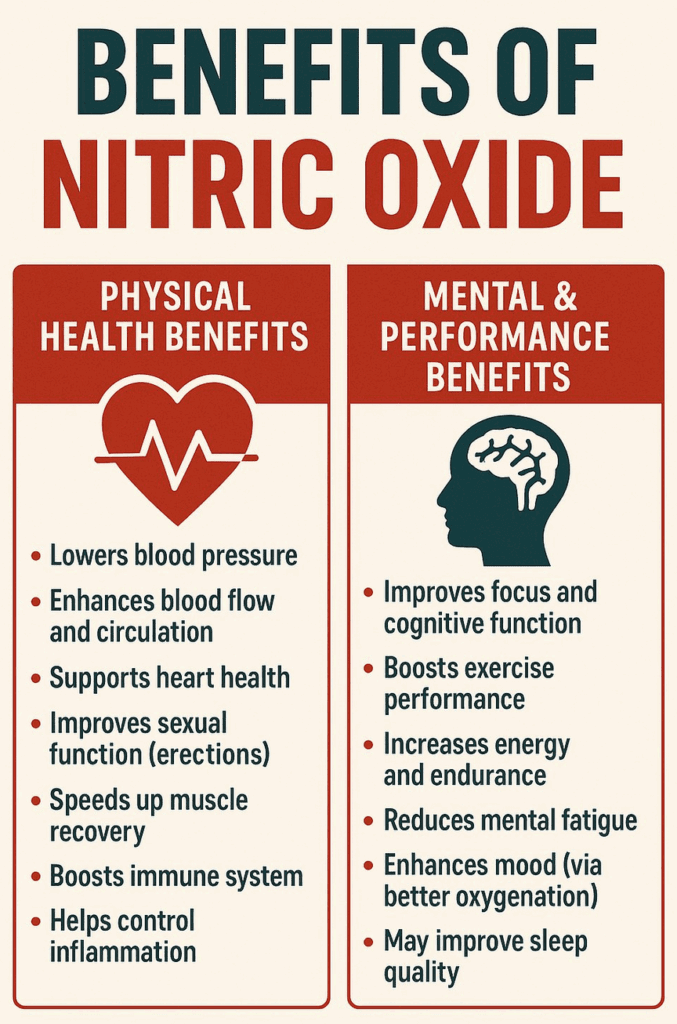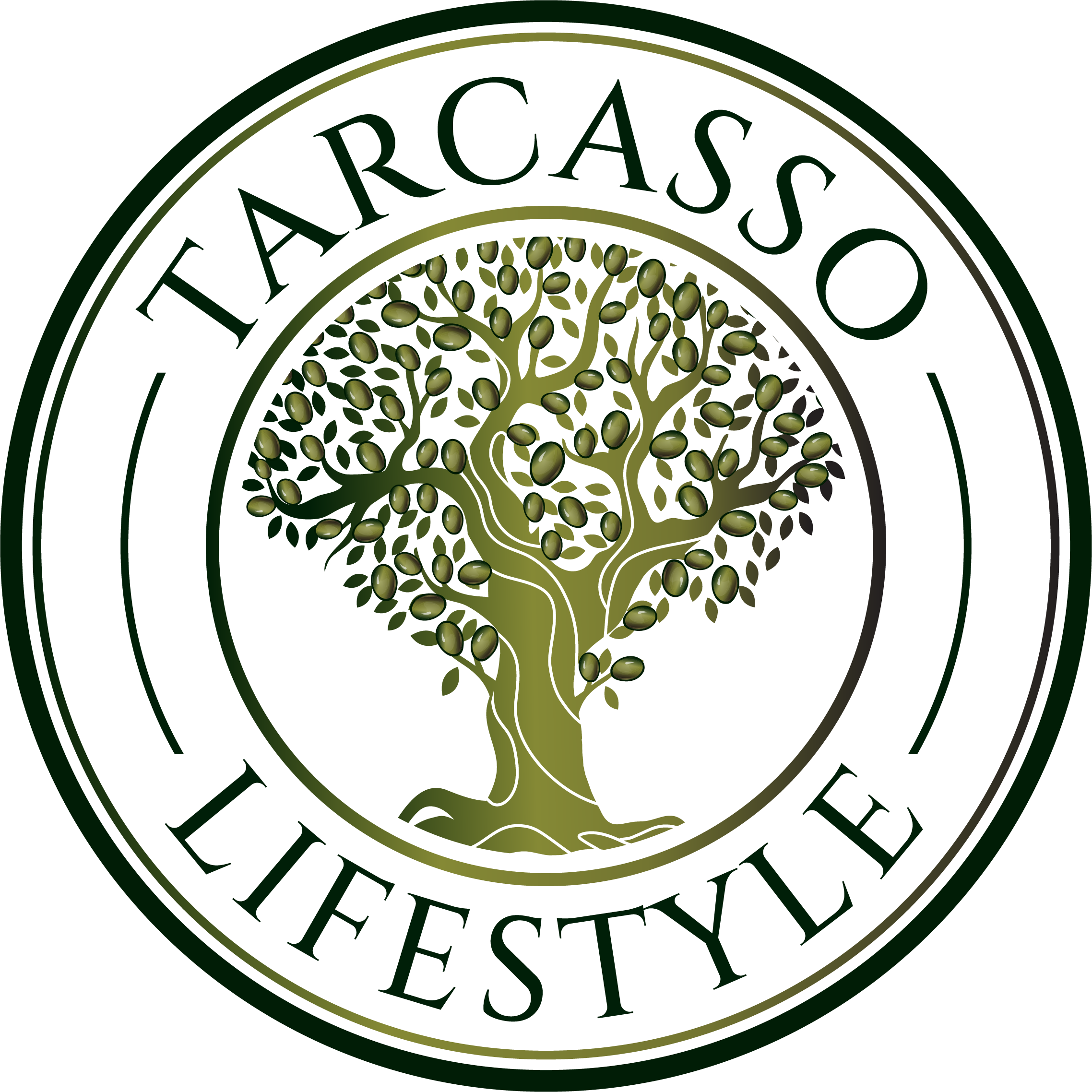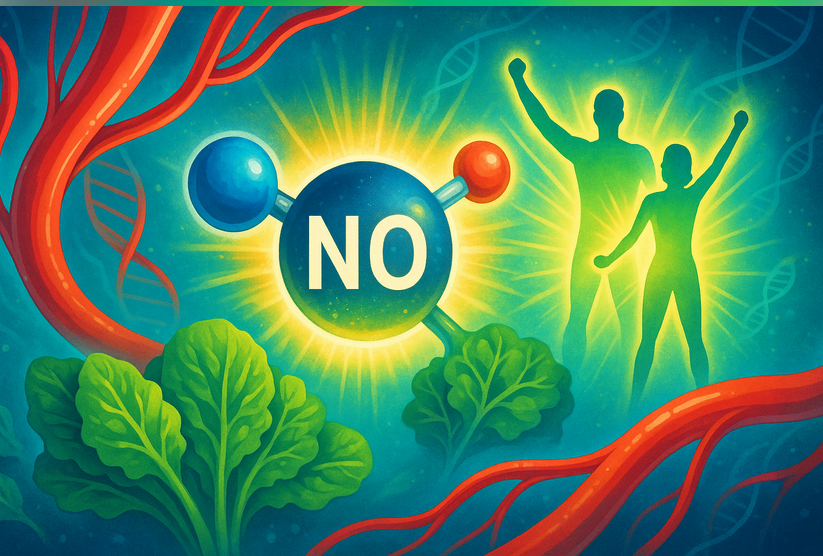Nitric oxide (NO) is a tiny, colorless gas, but its role in the human body is massive. Discovered as a key signaling molecule—and earning the 1998 Nobel Prize in Physiology or Medicine for its discoverers—nitric oxide is now recognized as foundational for health and longevity, impacting almost every aspect of wellness.
What Is Nitric Oxide and Why Does It Matter?
Nitric oxide is produced naturally within the lining of blood vessels and acts as a messenger, telling muscles and organs how and when to act. Its most famous job? Telling blood vessels to relax and expand. This action improves circulation, oxygen delivery, and nutrient transport, supports the immune system, helps regulate inflammation, and powers your cells’ mitochondria (your cells’ “batteries”). Sources: 1,2,3.
But its impact does not stop there: nitric oxide is necessary for brain health, learning and memory, sexual function, sleep quality, and even bone health. Sources: 4,5,2.
How Nitric Oxide Changes as We Age
One of the less well-known facts about aging is that your body’s ability to make nitric oxide drops dramatically.
- After age 40, natural NO production can drop by over 50%. Source:1.
- By age 60, levels may fall by as much as 75% compared to youth. Sources: 5,6.
- This decline can affect even healthy adults—with no other risk factors—due to changes in blood vessel function, enzyme activity, and changes in diet and the bacteria in our mouths and gut.
As nitric oxide levels decline, the risks for problems such as stiffer arteries, higher blood pressure, lower exercise capacity, reduced cognitive ability, and even bone loss all increase157. The good news: science suggests that supporting and restoring nitric oxide production can help counteract some aspects of biological aging.
The Link Between Nitric Oxide and Longevity

Healthy nitric oxide production is associated with:
- Better blood vessel function and lower blood pressure
- Improved exercise capacity and muscle recovery
- Enhanced delivery of nutrients and removal of toxins
- Lower inflammation and better immune response
- Improved insulin sensitivity and metabolic health (Sources:1,8,9,5,2)
All of these factors are critical for maintaining a long, healthy, and active life. Nitric oxide is also known as the “longevity molecule.”
How Behaviors Influence Nitric Oxide Production
Certain habits can support or hinder your body’s natural nitric oxide production.
Behaviors and Diets That Boost Nitric Oxide:
- Eat nitrate-rich vegetables: Leafy greens (spinach, arugula), beets, celery, and pomegranates all enhance nitric oxide. Dietary nitrates are converted by bacteria in your mouth to nitrites, then into NO in the body. Sources: 4,10,11).
- Nourish your oral and gut microbiome: Healthy bacteria are essential. Overusing antiseptic mouthwash or antibiotics can lower NO by disrupting bacteria needed for nitrate conversion. Sources: 4,11,12).
- Get regular, moderate exercise: Physical activity boosts blood flow and increases your body’s ability to make NO, improving heart and metabolic health. Sources: 4,13).
- Ensure sun exposure: Sunlight on the skin can trigger mechanisms that support nitric oxide production12.
- Practice nasal breathing: Breathing through your nose (not your mouth) can increase nitric oxide in your airways and support oxygen delivery. Sources: 4).
- Prioritize good sleep: NO plays a role in regulating sleep cycles, particularly deep and REM sleep—which also supports mental sharpness and longevity. Sources: 4).
- Include arginine and citrulline-rich proteins: These amino acids, found in protein-rich foods, help your body create more NO. Sources: 4).
Behaviors That Reduce Nitric Oxide:
- Sedentary lifestyle: Lack of movement impairs blood flow and NO production. Sources: 4,13).
- Overuse of antiseptic mouthwash and antibiotics: These kill beneficial bacteria critical for NO synthesis. Sources: 4,11,12).
- Chronic poor diet: Low intake of nitrates from veggies and low-quality protein reduces substrate availability for NO production. Sources: 4,10).
- Chronic stress, poor sleep, and excessive alcohol consumption: All have been linked to impaired NO production through various mechanisms. Sources: 4).
- Age-related decline and health conditions: Diabetes, hypertension, obesity, and metabolic syndrome can further suppress NO production and effectiveness. Sources: 7,5).
Supporting Nitric Oxide for Healthy Aging
Given its integral role in so many vital processes, actively supporting nitric oxide production can pay dividends for healthy aging:
- Eat a diverse, plant-centered diet
- Exercise regularly
- Maintain oral and gut microbiome health
- Avoid unnecessary antiseptics and antacids
- Embrace sunlight and stress reduction practices
If you’re truly dedicated to optimizing lifespan and “healthspan” (the years you’re healthy and independent), prioritizing behaviors and nutrients that preserve nitric oxide is one of the simplest, most science-backed strategies available. Sources: 1,9,5).
In summary: Though invisible, nitric oxide is a powerful driver of health and longevity. By making lifestyle choices that enhance nitric oxide production—and avoiding those that compromise it—you can help keep your blood vessels, brain, and entire body youthful for longer.
Sources:
- https://dexascan.com/blogs/news/the-longevity-molecule-why-nitric-oxide-is-essential-for-healthy-aging
- https://carolyngeorgemd.com/blog/nitric-oxide/
- https://learn.a4m.com/pages/nitric-oxide
- https://plminstitute.org/plmi-blog/what-is-the-role-of-nitric-oxide-and-how-does-it-impact-health/
- https://osteostrong.com.au/why-nitric-oxide-declines-with-age-and-how-it-affects-your-bone-and-metabolic-health/
- https://pmc.ncbi.nlm.nih.gov/articles/PMC3390088/
- https://www.ahajournals.org/doi/10.1161/jaha.114.000973
- https://pubmed.ncbi.nlm.nih.gov/37833980/
- https://pmc.ncbi.nlm.nih.gov/articles/PMC10572643/
- https://pmc.ncbi.nlm.nih.gov/articles/PMC4488823/
- https://www.healthline.com/nutrition/how-to-increase-nitric-oxide
- https://trainright.com/nitric-oxide-foods-behaviors/
- https://www.sciencedirect.com/science/article/pii/S1089860322000659
- https://www.sciencedaily.com/releases/2013/02/130214132623.htm
- https://pmc.ncbi.nlm.nih.gov/articles/PMC3592952/
- https://www.youtube.com/watch?v=zECoaEZRRFU
- https://www.healthline.com/nutrition/nitric-oxide-supplements
- https://pmc.ncbi.nlm.nih.gov/articles/PMC2953417/
- https://www.mdpi.com/1422-0067/24/19/14533
- https://www.sciencedirect.com/science/article/pii/S0092867422007152





